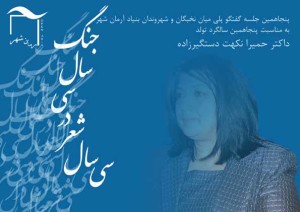Ms. Nek’hat: 30 years of poetry in 30 years of war
In the name of God of Life and Mind
IN the name of the Lord of both wisdom and mind,
To nothing sublimer can thought be applied
This great verse of the epic maker of Persian language and literature, Ferdowsi, was the prologue to the 50th Goftegu public debate, a bridge between the elite and the citizens, of Armanshahr Foundation.
Wisdom is the most important gift in human being and it can only be transferred to others by the power of expression. As noted time and again, our meetings regard dialogue as an alternative to war and violence. Many years of war and fear, killing and rebellion against humans, and fanaticism have smashed our political, social and cultural foundations.
We are living in a land where attention to the power of “said” has deep roots. That has been given so much attention that the powerful language of poetry has been the carrier of our greatest thoughts in many areas.
The alternative offered by Armanshahr to the present situation, which it is following through the Goftegu series, a bridge between the elite and the citizens, is nothing new to the culture of our ancestors. We believe today is the time to “say.” We believe we should sit face to face and untie the knots of our problems, rather than take guns and take to the fields to write with the blood of each other: War, war, war… What we should point out here is that we have seldom witnessed perseverance in valuable deeds. There may be two reasons for this. First, we take steps not based on dedication but on emotions and we regret them immediately. Second, we expect fast results.
Every action, in particular civil activities, needs continuity and perseverance and it may bear fruit decades later. This is how the Goftegu series have reached their No. 50. This is an important number and we know it signifies 50 months of indefatigable endeavour.
The 50th public debate was concerned with celebrating a lady who has spent 30 years of her life in 30 years of wars, when either bullet rained at her or she was forced to live in strange lands where her dark hair and eyes and Afghan name could result in humiliation. We celebrated the 50th birthday of a lady whose every breath is living poetry.
A woman is riding in on the back of the Sun
Call on the sleeping lands
And sound out the spoken word
A woman is arriving
Having passed through the night
She is mother to new words
And the sky is heaving under her steps.
The moderator recited this verse from Ms. Nek’hat to begin the meeting. Next Vali Shah Bahra, director of Information and Culture Department of Herat, congratulated the birthday of the great lady on behalf of the cultural activists of the city.
Ms. Nek’hat then began by reciting a verse from Hafiz and subsequently a number of young poets recited their own verses, including: Ali-Shah Hakimi, Farbia Haydari, Elaheh Sahel, Assadollah Yussefi, Nahid Motahhari, Karim Hosseini, Nila Haghpanah, Shabgir Pouladian, Rashed Ramez and Vakil-Ahmad Naji.
In the third part of the programme, Ms. Nek’hat made a speech on 30 years of poetry during 30 years of war in Afghanistan. Pointing out the verses recited by the Herati poets, she said poetry is a dynamic current in Herat and argued that we have maintained our bonds with classical literature as strong as before despite all the translations from Russian and other East-European literature.
Ms. Nek’hat went on: New forms of verse initially had little impact in Afghanistan, but in the years of migration in particular in Iran, several new poetical forms influenced our poetry.
Arguing that war had influenced our poetical language, she named some of the people who had written war poems.
The 50th Goftegu public debate was held at Allameh Saljuki Hall of Herat on Thursday, 29th April 2010, with 200 cultural activists in attendance. BBC, Herat Radio and TV, Mojdeh Radio and others covered the meeting.
During the past four years, Armanshahr Foundation has organised 50 Goftegu public debates in Kabul and Herat on topics concerning transitional justice, human rights, citizen rights and tasks, women’s rights, freedom of expression, social justice, globalisation etc. More than 200 speakers from the academia, civil society, national and international human rights organisations, parliament, government, and media have addressed the meetings. More than 8,200 people, including students, cultural activists, civil and human rights activists have benefited from the meetings. Women have constituted 30 per cent of both the speakers and the participants. The meetings were covered by the national and international media in the most part.
During the second Presidential Election, Armanshahr allocated seven public debates of the Goftegu series to problems of citizens and programmes of presidential candidates. A new series of Goftegu meetings will deal with the upcoming parliamentary elections.
Invitation



